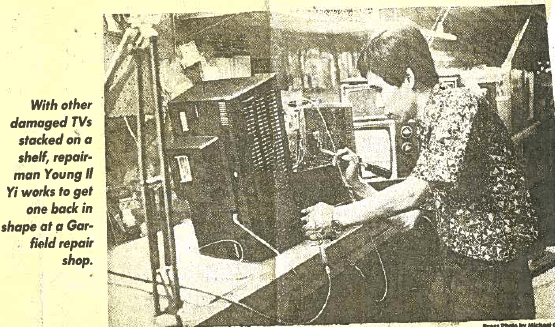About Daniel
Meet Daniel
Daniel has been interested in electronics his whole life and studied it in high school. He later attended and obtained formal training at the Korea Electronics Institute for three years. In 1978, Daniel moved from Korea to Pennsylvania.
From 1980-1985, Daniel
also worked at a Panasonic Service Center. In 1985, he opened Daniel's TV Service
with more than 45 years of
industry experience.
He has repaired electronics for both the Korean and the US Army, and received an Achievement Medal from the US Army. Daniel has also taught an electronics class at the US Steel Mill in Braddock, Pennsylvania. He is very proud of his work and takes on any issue presented without giving up.

Newspaper Article Featuring Daniel from 1980
The unusual spate of electrical storms this summer has had a striking effect on one sector of the city’s economy – the television repair business.
After each powerful storm, TV owners pour into the repair shops with zapped sets. Though customers seem perplexed when their sets go on the blink during a flashing storm, owners and operators of repair shops are not surprised by the booming business.
“We like them (electrical storms,” shop owner Al Dully said. “I like the storms when they hit real hard. It brings in the buck,” said the owner of Etna Electric & Appliance center in Lawrenceville. “In they come, right after a storm, a rash of TV’s”
Other shop operators may not find as much humor in their customers’ plight, but most have come to expect an influx of sets after a storm.
Kurt Carbon, vice president of Twin Pines Inc on the South Side said he usually gets about 5 to 10 sets to repair after a storm.
Carlson said the damage is usually “relatively minor” – with repair costs averaging about $25 – and it can be prevented; During an electrical storm, pull the plug on your set and disconnect the antenna.
Marie Miller, the bookkeeper at National Television Service Inc., described a typical case: “The customer says he was watching TV during the storm and heard a loud clap of thunder, saw a bright flash of lightning and the set went out.”
She explained that in such cases the lightning has probably struck the main power-line transformer in the area, causing a power surge that travels through the lines into the building, and then through the plug wire into the TV set. If the set has a circuit breaker – many of the newer electronic sets don’t – the set will shut off without any damage.
But if the breaker is faulty, non-existent, or not strong enough to withstand the power surge, the set’s entire power supply system may be burned out. The extent of damage, she said, depends on the make and age of the set.
If the lighting hits the TV antenna and it is not grounded, however the set owner may be in trouble. “if the antenna takes a direct hit, your TV set is fried and so is your roof,” Carlson said.
Jim LiVolsi, service manager of an RCA service shop said that although “a lot of people have been made aware” of the problem of not having a ground on the antenna, not everyone has one yet. Nevertheless, direct hits on antennas are rare.
Unfortunately, lightning does not have to score a direct hit on power lines or antennas to cause damage. A near miss is sufficiently powerful to cause a power surge – otherwise known as a “spike,” said Tim Herriott, a technician in the Sears and Roebuck television repair department.
“Right now we’re swamped with sets from the last storm” he said, “Our work load just about doubles after each storm.”
Herriott had more disturbing news for TV owners, “The newer the set, the worse it is,” he said. Like most of the repair shop operators, he found the transistors in solid-state sets to be more susceptible to the power surges.
“A transistor can be wiped out in less than a second. Tubes are very forgiving, they will stand a momentary overload much better” he said.
Moreover, though the extent of the damage varies with the strength of the spoke, Harriott said, repairs to the newer solid state sets are more likely to be expensive, especially if the affected set is a color set. Even worse, the newer sets don’t have circuit breakers to protect them against spikes.
And to pale woe upon woe, he said, “people on the cable system can get hit anywhere along the line” and stereos, too, can be affected by the same stroke of bad luck. The least expensive move in a thunderstorm seems to turn off the electronic entertainment and enjoy nature’s own sound and light show.
Contact
Daniel's TV Service in Monroeville, Pennsylvania, to request electronic repair
service for your household items.




